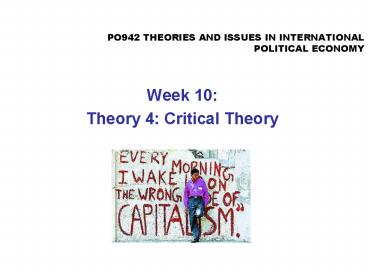PO942 THEORIES AND ISSUES IN INTERNATIONAL POLITICAL ECONOMY - PowerPoint PPT Presentation
1 / 9
Title:
PO942 THEORIES AND ISSUES IN INTERNATIONAL POLITICAL ECONOMY
Description:
Pay attention to your own specific feedback the intention is to help you to ... Apply the Coxian triptych of ideas, material capabilities and institutions to ... – PowerPoint PPT presentation
Number of Views:609
Avg rating:3.0/5.0
Title: PO942 THEORIES AND ISSUES IN INTERNATIONAL POLITICAL ECONOMY
1
PO942 THEORIES AND ISSUES IN INTERNATIONAL
POLITICAL ECONOMY
- Week 10
- Theory 4 Critical Theory
2
Some general feedback on the first timed essays
For a full explanation of the marking criteria
used in PAIS, see the Handbook, pp. 54-56
- Pay attention to your own specific feedback
the intention is to help you to improve for
future writing tasks - Here are some general reflections based upon our
reading of your round 1 timed essays (these
comments also apply to good practice in research
essays)
3
- answer the question!
- assertions/claims must be backed by evidence
- data elaboration citation etc sometimes
citation is a little thin - follow through on the points that you make
complete the argument - avoid excessive description
- descriptive details are useful, but only in so
far as they propel the analysis/argument forward
the puzzle embedded in the question is never
purely empirical. - explanation and or critical analysis requires
more than a simple list of factors - this gives you hypotheses, not a full argument
about those hypotheses - the argument follows from your critical
discussion of which factors are important - the best essays will always be
theoretically-informed - helps to organise your material, gives you a
framework - avoid excessive or lengthy quotation
- reference according to standard conventions
- cite all sources see the Graduate Handbook if
you are not sure
Next timed essay 18 Jan - 21 Jan 2008
4
Imperialism
Open Marxism
Marxism
Dependency and World Systems Theory
- This weeks objectives
- understand the meaning of critical theory when
applied to the study of IPE - understand how critical approaches to IPE
relate the other traditions we have studied so
far - outline and evaluate the main ideas of Robert W.
Cox as they apply and to assess their influence
and usefulness - consider the emergence of transnational
historical materialist/neo-Gramscian IPE and
assess its usefulness
Gramsci
Critical theory / Frankfurt School
Critical / Gramscian / Coxian / transnational
historical materialist IPE
Much more prominent in British/non-American
rather than American IPE
5
What is critical about these critical approaches?
Theory is always for someone and for some
purpose. All theories have a perspective.
Perspectives derive from a position in time and
space. The world is seen from a standpoint
definable in terms of nation or social class, of
dominance or subordination, of rising or
declining power, of a sense of immobility or of
present crisis of past experience, and of hopes
and expectations for the future The more
sophisticated a theory is, the more it reflects
upon and transcends its own perspective but the
initial perspective is always contained within a
theory and is relevant to its own explication.
There is accordingly, no such thing as a theory
in itself, divorced from a standpoint in time and
space. Robert W. Cox Social forces, states and
world orders beyond international relations
theory, Millennium 10(2), 1981.
Do you agree? Is value-free, objective theory
impossible? What is at stake here for the study
of IPE?
If we accept Coxs dictum, how should we think
about important conventional theories of IPE
such as liberalism and realism?
6
Theory
Problem-solving
Critical
Reflective on process of theorising and does not
take for granted existing institutions / ideas
historical change possibilities for change
Puzzle solving within the terms set by a
particular perspective non-historical or
a-historical assumption of fixity conservative
7
Gramsci and the reconceptualisation of hegemony
Gramscis problem Why has there not been an
overthrow of capitalism in the most advanced
capitalist states?
or how is class rule maintained in capitalist
society?
- Hegemony
- Not brute domination
- Intellectual and moral
- leadership
- Cognitive dominance
- via the dispersion of
- capitalist ideas
- - which come to be
- regarded as common-
- sensical/normal
- - Class rule via consent
coercion
Implications for IPE?
Strategic implications counter-hegemony
8
Robert Coxs research programme in IPE
Historical structures persistent social
practices, made by collective human activity, and
transformed through collective human activity
Robert W. Cox Production, Power and World Order,
Columbia University Press, 1987, p. 4
Interaction of
Material capabilities
Ideas
Institutions
Collective images of social order
Intersubjective meanings
9
Applying Critical Political Economy Coxs
approach asks us to think about historical
structures in terms of the interaction of
ideas, material capabilities, and institutions.
- Apply the Coxian triptych of ideas, material
capabilities and institutions to particular
episodes / periods in the development of the
global political economy that we have studied. - How easy is it to deconstruct political
economy analysis into these categories? - How does analytical distinguishing between these
aspects of worlds order help in identifying the
dynamics of change within political economy? - What are the problems with this approach?































